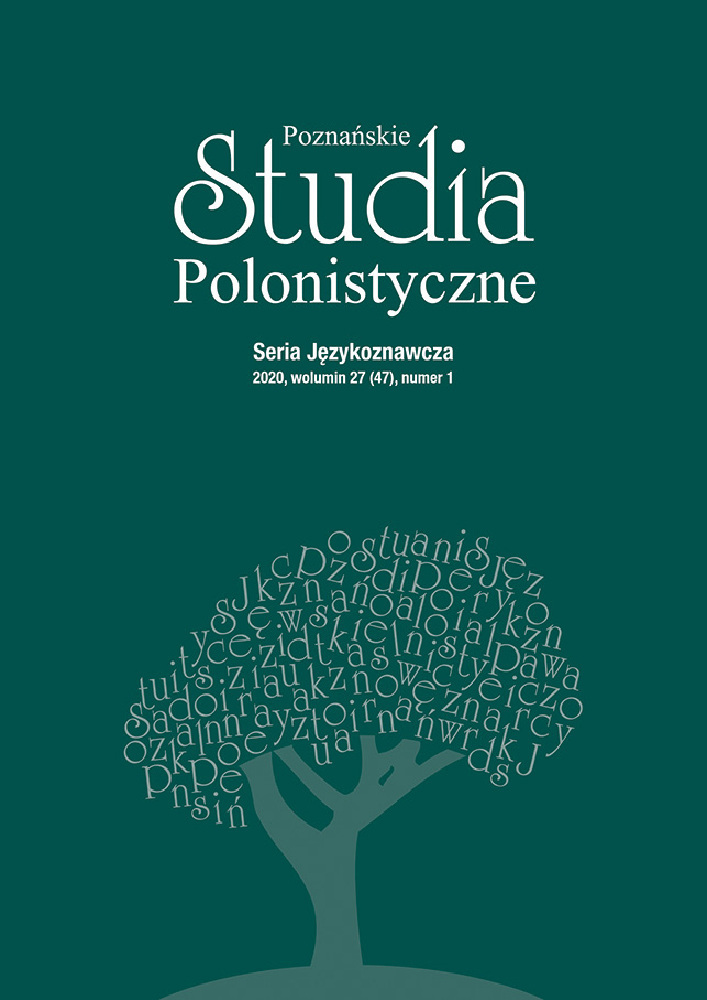Abstract
The article discusses the influence of Polish on the evolution of Ruthenian Uniate Church’s liturgical language in the eighteenth century in the Polish-Lithuanian Commonwealth according a catechism text published in the Supraśl and Pochayiv Basilian Order Monasteries in 1722 and 1768. The Ruthenian Uniate Church catechism constitutes the basis for the linguistic analysis. The main objective of the article is to investigate how Middle Polish influenced the developing liturgical language of the Ruthenian Uniate Church. After analysing the text’s language, it could be said that in the period from the foundation of that church to the three partitions of the Polish-Lithuanian Commonwealth, Polish language had significant influence on the evolution of the church’s liturgical language and affected its phonetics and morphology.
References
Narodovišanie, ili slovo k narodu kafoličeskomu… (1768), w drukarni Bazylianów, Počajów.
Sobranije prypadkov kratkoje i duhovnym osobam potrebnoe imeeščee v sebe nauku o sakramentah, o desâti Božiih prykazaniâh… (1722), w drukarni Bazylianów, Supraśl.
Synod Prowincjalny Ruski w Mieście Zamościu (1785), w drukarni XX. Bazylianów, Wilno.
Literatura
Bulyka Alâksandr, red. (1980), Leksìčnyâ zapazyčannì u belaruskaj move XIV–XVIII stst., Navuka ì tèhnìka, Mìnsk.
Didik-Meuš Ganna (2018), Kombìnotorika v ukraïnskìj movì XVI–XVIII stolìt’: teorìâ, praktika, slovnik, Nacìonal’na Akademìâ Nauk Ukraïni Ìntitut Ukraìnoznavstva ìm. Ì. Krip’âkeviča Naukove Tovaristvo ìm. Ševčenka, L’viv.
Długosz-Kurczabowa Krystyna, Dubisz Stanisław (2006), Gramatyka historyczna języka polskiego, Wydawnictwo UW, Warszawa.
Hojnakìj Andrej (1871), Zapadnorusskaâ cerkovnaâ uniâ v eâ bogosluženìì ì obrâdah, Ìzdanie Kìevopečerskoj Lavry, Kiev.
Karskij Efimij (1885), Obzor zvukov ì form belorusskoj rečì, Unìversìtetskaâ tipografiâ, Moskva.
Karskij Efimij (1962), Trudy po belorusskomu ì drugìm slavânskìm âzykam, Akademiâ Nauk SSSR, Moskva.
Kietliński Marek, Sychowicz Krzysztof, Śleszyński Wojciech, red. (2005), Kościoły a państwo na pograniczu polsko-litewsko-białoruskim: źródła i stan badań, Prymat, Białystok.
Kisel’ov Roman (2002), Ukraïnomovnì katehizìsi Počaïvs’kogo druku ta ïh lrksika, „Aktual’nì problemi ukraïns’koï lingvistiki. Teriâ ì praktika”, z. 6, s. 64–74.
Likowski Edmund (1906), Dzieje kościoła unickiego na Litwie i Rusi w XVIII i XIX wieku, Skład główny w Księgarni Gebethnera i Wolffa, Warszawa.
Łużny Ryszard, Ziejka Franciszek, Kępiński Andrzej, red. (1994), Unia brzeska: geneza, dzieje i konsekwencje w kulturze narodów słowiańskich, Drukarnia UJ, Kraków.
Walczak Bogdan (2009), Język polski wśród języków Europy dawniej i dziś, „Studia Językoznawcze”, z. 8, s. 167–176.
Wereda Dorota (2013), Biskupi unickiej metropolii kijowskiej w XVIII wieku, Werset, Siedlce–Lublin.
Žovtobrûh Mihajlo, Rusanìvs’kij Vitalìj, Sklârenko Vìtalìj, red. (1979) Istorìâ ukraïns’koìï movi Fonetika, Naukova dumka, Kiïv.
Žurauskì Arkadz’, red. (1988), Mova belaruskaj pìsmennascì XIV–XVIII stst, Navuka ì tèhnìka, Mìnsk.
License
Authors
The Author declares that they are entitled to personal and property (material) copyrights to their work published in “Poznańskie Studia Polonistyczne. Seria Językoznawcza”, and that these rights are not limited by the terms of Author’s agreement. The Author warrants the originality, authorship, and sole ownership of all rights to the Work, and affirms that they have the right to grant all kinds of licenses hereinabove without infringing on the intellectual property rights of any third party, including personal rights.
The Author(s) retains copyright to their article and the right to freely dispose of the work, granting Adam Mickiewicz University in Poznań a non-exclusive, royalty-free licence under the Attribution-NoDerivatives 4.0 International (CC BY-ND 4.0) Creative Commons licence to use the Work without territorial restrictions for an indefinite period in the fields of use designated in the Author’s agreement.
Users
Interested Internet users are entitled to use works published in „Poznańskie Studia Polonistyczne. Seria Językoznawcza” since 2016 under the following conditions:
- attribution - obligation to provide, together with the distributed work, information about the authorship, title, source (link to the original work, DOI) and the license itself.
- no derivatives - the work must be preserved in its original form, without the author's consent it is not possible to distribute the modified work, such as translations, publications, etc.
Copyrights are reserved for all texts published before 2016.
Other
Adam Mickiewicz University in Poznań retains the right to the journal as a whole (including its layout, graphic design, title, cover design, logo and more).
